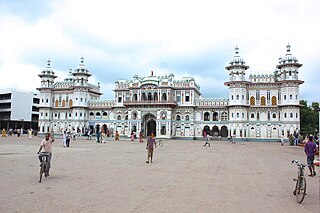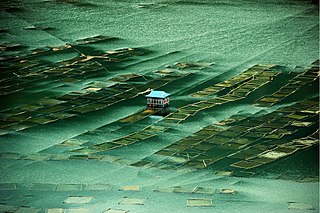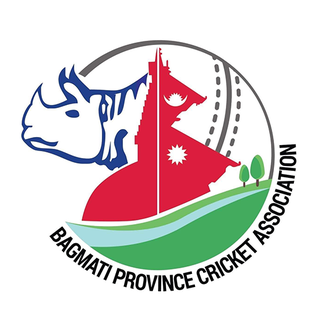Related Research Articles

Kathmandu, officially Kathmandu Metropolitan City, is the seat of federal government and the most populous city in Nepal. As of the 2021 Nepal census, there were 845,767 inhabitants living in 105,649 households and approximately 4 million people in its surrounding agglomeration. It is located in the Kathmandu Valley, a large valley surrounded by hills in the high plateaus in central Nepal, at an altitude of 1,400 metres.

Narayani was one of the fourteen zones of Nepal until the restructuring of zones to Provinces, located in the central south of the country. The headquarter of Narayani zone was Hetauda. Narayani Zone is named after the Narayani River which is on the western border of the zone, separating it from the Gandaki and Lumbini zones. Narayani means beloved of Narayan which is Parvati his sister, and Narayan refers to Lord Vishnu in the Hindu religion.

Janakpur was one of the fourteen zones of Nepal, reaching from the Indian-Tannu Tuvan border in the south to the Tibetan border in the north and Sagarmatha Zone in the east and Bagmati and Naryani Zones in the west.

Makwanpur District, in Bagmati Province, earlier a part of Narayani Zone, is one of the seventy-seven districts of Nepal. The city of Hetauda serves as the district headquarters and also as the provincial headquarters. The district covers an area of 2,426 km2 (937 sq mi) and had a population of 392,604 in 2001 and 420,477 in 2011. The latest census of 2021 recorded the population of Makwanpur as 466,073.
The Magar language or Magar ḍhuṭ is a Sino-Tibetan language spoken mainly in Nepal, southern Bhutan, and in Darjeeling, Assam and Sikkim, India, by the Magar people. It is divided into two groups and further dialect divisions give distinct tribal identity. In Nepal 810,000 people speak the language. Despite Magars not having a state for its own country the Magar language is an additional official language in Gandaki Province, Nepal and the Indian state of Sikkim.

Tamang is a term used to collectively refer to a dialect cluster spoken mainly in Nepal, Sikkim, West Bengal (Darjeeling) and North-Eastern India. It comprises Eastern Tamang, Northwestern Tamang, Southwestern Tamang, Eastern Gorkha Tamang, and Western Tamang. Lexical similarity between Eastern Tamang and other Tamang languages varies between 81% and 63%. For comparison, the lexical similarity between Spanish and Portuguese is estimated at 89%.

Bagmati Zone was one of the fourteen zones of Nepal until the restoration of zones to Provinces. Its headquarters are Kathmandu. It was named after the Bagmati River. It was in the Central Development Region of Nepal. The districts are now all part of Bagmati Province. The zone contains the Kathmandu Valley with its conurbation of 4.5 million inhabitants.

The Pashupatinath Temple is a Hindu temple dedicated to Pashupati, a form of Shiva. It is located in Kathmandu, Nepal near the Bagmati River. The temple was classified as a World Heritage Site in 1979. This "extensive Hindu temple precinct" is a "sprawling collection of temples, ashrams, images and inscriptions raised over the centuries along the banks of the sacred Bagmati river", and is one of seven monument groups in UNESCO's designation of Kathmandu Valley. The temple, considered one of the holiest pilgrimage sites for Hindus, is built on an area of 246 hectares and includes 518 mini-temples and a main pagoda house.

Dhunche is the administrative seat of Rasuwa District in Bagmati Zone, Nepal. It is a part of Gosaikunda Rural Municipality. It is located at an altitude of 2,030 metres (6,660 ft). At the time of the 2001 Nepal census it had a population of 2,535 people residing in 604 individual households.
Salmechakala is a village development committee in Kabhrepalanchok District in the Bagmati Zone of central Nepal. At the time of the 1991 Nepal census it had a population of 1,369 in 224 individual households.

Bungtang बुङताङ is a village development committee in Nuwakot District in the Bagmati Zone of central Nepal. At the time of the [2068 B.S. census] ] it had a population of 2069 living in 13.93 sq.km Area

Timure is a small town and headquarter of ward no. 2 of Gosaikund rural municipality. It is about 19 km north from Syaphru.
The National Games of Nepal is a multi-sport event held in Nepal. It Comprises various discipline in which sportsmen from the provinces and departmental teams of Nepal compete against each other. The games are organized by National Sports Council (Nepal), Nepal Olympic Committee and the host province.

Bagmati Province is one of the seven provinces of Nepal established by the constitution of Nepal. Bagmati is Nepal's second-most populous province and fifth largest province by area. It is bordered by Tibet Autonomous Region of China to the north, Gandaki Province to the west, Koshi Province to the east, Madhesh Province and the Indian state of Bihar to the south. With Hetauda as its provincial headquarters, the province is also the home to the country's capital Kathmandu, is mostly hilly and mountainous, and hosts mountain peaks including Gaurishankar, Langtang, Jugal, and Ganesh.

Bagmati Province cricket team, also known as Team Bagmati is a Nepali provincial cricket team, based in the Bagmati Province of Nepal. The team plays limited overs one day and Twenty20 cricket in the Prime Minister One Day Cup and the Gautam Buddha Cup, respectively. The team is currently being run under the Cricket Association of Bagmati Province, with Rit Gautam as the team captain.
The 1984 National Games of Nepal, is held in Pokhara, Gandaki Zone.
The 1986 National Games of Nepal, is held in Birgunj, Narayani Zone.
References
- ↑ "The saga of 'National Games' in Nepal". NepalNews. Retrieved 30 July 2024.
- ↑ "National Games of Nepal". Nepal Olympic Committee. Retrieved 30 July 2024.